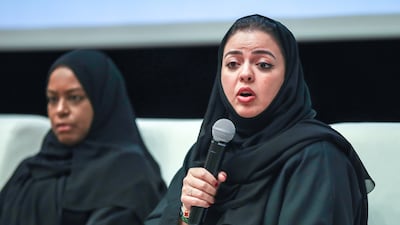Women remain a minority in the climate change agenda and must feature in all discussions if the gender gap is to close, a UN Women's conference heard on Tuesday.
Historically, women have been more vulnerable than men to the effects of climate change.
This is especially felt in remote, rural areas and villages where women are often guardians of natural and household resources, with no access to clean water and, in some instances, experiencing extreme weather such as drought or flooding.
At a session held at the General Women’s Union in Abu Dhabi, Sheikha Dr Moza bint Tahnoun Al Nahyan, adviser to the UAE's Ministry of Foreign Affairs and International Co-operation, said immediate action was needed to involve women in climate change decisions.
“We find ourselves at a pivotal moment in history, where the fate of our planet and our well-being, especially that of our youth and future generations, hangs in the balance," she said.
"It is crucial that we take transformative action now. Climate change does not affect everyone equally.
"Unfortunately, women and girls bear a disproportionate impact and burden that is placed mostly on those who are must are most vulnerable, such as refugees and rural women."
Sheikha Dr Moza said 80 per cent of all people displaced by climate emergencies are women and girls.
“Additionally, they experience the loss of livelihoods, food security and limited access to clean water and salination," she said.
"They are also burdened with increased care responsibilities as communities strive to build resilience and cope with the effects of climate change. ”
Closing the gap

Mouza Al Shehhi, director of UN Women GCC Liaison Officer, outlined key priorities and steps that must be taken to close the gender gap.
She said it was crucial to address the specific needs and vulnerabilities of women and girls.
"By integrating gender considerations into our climate strategies, we can ensure a more inclusive response," Ms Al Shehhi said.
“Women's leadership is a catalyst for transformative change in climate action.
"Let us create spaces for women to participate meaningfully in decision-making processes. Together, we can break down barriers and unleash their potential to shape sustainable solutions.”
She said creating women-led finance initiatives would have a far-reaching effect on rural communities.
“Women often face challenges in accessing financial resources to address climate change," Ms Al Shehhi said.
"It is essential to design climate finance initiatives that support women-led initiatives, providing them with the necessary funding and opportunities. By investing in women, we invest in the resilience of our communities.”
Data-driven insights will help make informed decisions and develop policies that address the unique challenges faced by women and girls, she said.
As Cop28 approaches, Ms Al Shehhi said it was important to commit to gender-responsive climate action.
“Lastly, we must engage and empower youth. Young women and girls are essential in shaping our sustainable future.
"Let us create platforms for their voices to be heard and integrate their perspectives into our strategies. By nurturing their leadership, we ensure a legacy of resilience for future generations.”
Dr Dena Assaf, United Nations resident co-ordinator in the UAE, said more women need to be included in climate discussions.
“Unfortunately, women are still a minority among climate negotiators in the Mena region," she said.
"There are also very few women-led organisations participating in UNFCCC’s Women and Gender Constituency.
"This gap is particularly important for the youth and young women, where their energy and promising ideas can be instrumental in helping us overcome climate change challenges.”







